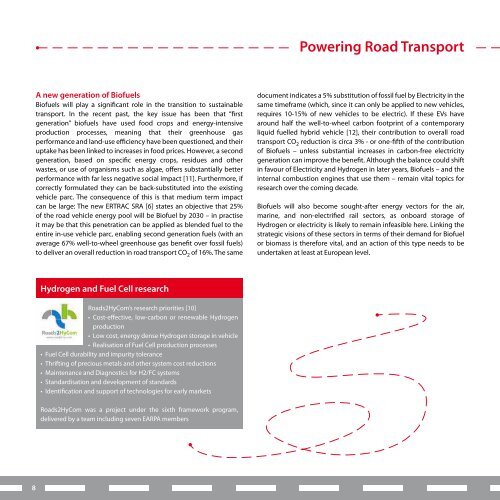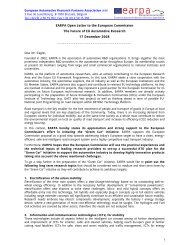A Vision for Integrated Road Transport Research - EARPA
A Vision for Integrated Road Transport Research - EARPA
A Vision for Integrated Road Transport Research - EARPA
You also want an ePaper? Increase the reach of your titles
YUMPU automatically turns print PDFs into web optimized ePapers that Google loves.
Powering <strong>Road</strong> <strong>Transport</strong><br />
A new generation of Biofuels<br />
Biofuels will play a significant role in the transition to sustainable<br />
transport. In the recent past, the key issue has been that “first<br />
generation” biofuels have used food crops and energy-intensive<br />
production processes, meaning that their greenhouse gas<br />
per<strong>for</strong>mance and land-use efficiency have been questioned, and their<br />
uptake has been linked to increases in food prices. However, a second<br />
generation, based on specific energy crops, residues and other<br />
wastes, or use of organisms such as algae, offers substantially better<br />
per<strong>for</strong>mance with far less negative social impact [11]. Furthermore, if<br />
correctly <strong>for</strong>mulated they can be back-substituted into the existing<br />
vehicle parc. The consequence of this is that medium term impact<br />
can be large: The new ERTRAC SRA [6] states an objective that 25%<br />
of the road vehicle energy pool will be Biofuel by 2030 – in practise<br />
it may be that this penetration can be applied as blended fuel to the<br />
entire in-use vehicle parc, enabling second generation fuels (with an<br />
average 67% well-to-wheel greenhouse gas benefit over fossil fuels)<br />
to deliver an overall reduction in road transport CO 2 of 16%. The same<br />
document indicates a 5% substitution of fossil fuel by Electricity in the<br />
same timeframe (which, since it can only be applied to new vehicles,<br />
requires 10-15% of new vehicles to be electric). If these EVs have<br />
around half the well-to-wheel carbon footprint of a contemporary<br />
liquid fuelled hybrid vehicle [12], their contribution to overall road<br />
transport CO 2 reduction is circa 3% - or one-fifth of the contribution<br />
of Biofuels – unless substantial increases in carbon-free electricity<br />
generation can improve the benefit. Although the balance could shift<br />
in favour of Electricity and Hydrogen in later years, Biofuels – and the<br />
internal combustion engines that use them – remain vital topics <strong>for</strong><br />
research over the coming decade.<br />
Biofuels will also become sought-after energy vectors <strong>for</strong> the air,<br />
marine, and non-electrified rail sectors, as onboard storage of<br />
Hydrogen or electricity is likely to remain infeasible here. Linking the<br />
strategic visions of these sectors in terms of their demand <strong>for</strong> Biofuel<br />
or biomass is there<strong>for</strong>e vital, and an action of this type needs to be<br />
undertaken at least at European level.<br />
<strong>EARPA</strong>’s position on Biofuels<br />
• Biofuels with good environmental and social credentials will play a<br />
major role in de-carbonising road transport, because they are highly<br />
compatible with incumbent IC engine technology, and can be applied<br />
to the whole fleet, not just new vehicles<br />
• Robust, standardised methods are required to establish the life-cycle<br />
environmental credentials of biofuel production processes<br />
• Further research is needed to develop second generation production<br />
processes to the point of large scale commercial maturity; a pipeline<br />
of innovative processes should be established<br />
• The optimisation of engine technologies to match the properties of<br />
these new fuels requires ongoing research, embracing sensing, smart<br />
adaptation and new combustion / after-treatment processes<br />
Hydrogen and Fuel Cell research<br />
<strong>Road</strong>s2HyCom’s research priorities [10]<br />
• Cost-effective, low-carbon or renewable Hydrogen<br />
production<br />
• Low cost, energy dense Hydrogen storage in vehicle<br />
• Realisation of Fuel Cell production processes<br />
• Fuel Cell durability and impurity tolerance<br />
• Thrifting of precious metals and other system cost reductions<br />
• Maintenance and Diagnostics <strong>for</strong> H2/FC systems<br />
• Standardisation and development of standards<br />
• Identification and support of technologies <strong>for</strong> early markets<br />
<strong>Road</strong>s2HyCom was a project under the sixth framework program,<br />
delivered by a team including seven <strong>EARPA</strong> members<br />
8 9






